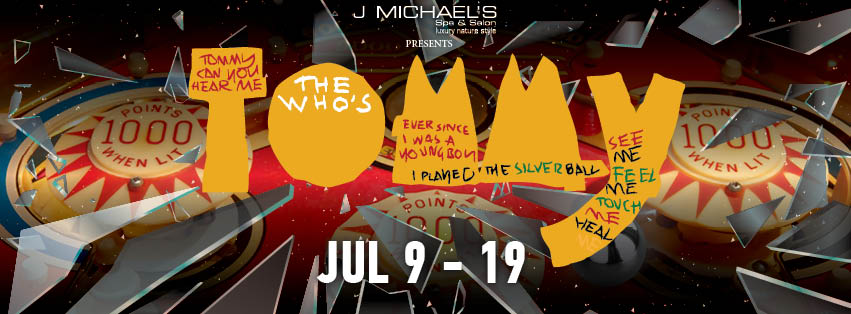
Lou.com: Is there an excitement in choosing something most haven’t seen the likes of before?
JL: Excitement and scared to death. It’s an expensive show. And whenever you do that, you hope that everyone will love it as much as you do and hope that people want to see it, but there is an unknown there. Whenever you do a season kick-off, this show will set the tone for the season; it sets a very important tone. It’s the first show a lot of new season ticket-holders will see. I think there’s a lot of pressure on the first show of the season.
Lou.com: But you have to take chances. As you were just saying, you’ve grown so much from where you first started- and that is precisely because you take those chances.
JL: And you also have to keep a young audience. When we choose a season, we can’t ignore that. We have to say, “Does a young person want to see Tommy?” And that was actually a question. Is it too old? Does it have staying power from the older The Who’s Tommy? And I think it does. Especially if they see the Broadway show.
To me, my big thing to get out is you don’t have to be a fan of The Who to love this show. It’s a brilliant story, and that’s a big thing I’ve been trying to push. The movie is kind of freaky. Have you seen the film? It’s a little bit freaky and had kind of a seventies thing…The lead singer from The Who played Tommy. Ann Margaret is in it. Tina Turner. Elton John actually created a character for the Pinball Wizard that’s not Tommy, and it’s pretty star-studded. However, it’s a little out there. So I don’t want the movie to scare people away.
At one point, Ann Margaret is swimming in a bin of baked beans that came from the TV. I don’t really get it. So it’s a little odd. But this is a true Broadway show. I mean, it is that way. It’s got a book. It’s got a story- and that’s the way we’re approaching it.
Lou.com: Speaking of the baked beans, some directors shy away from that whole pervasive '60s drug culture when taking on this show; some embrace it. How do you plan to interpret that? Do you want to tame the song “Acid Queen” or revel in the chaos of it?
JL: You know me…This show is definitely written at a time when that was happening, and clearly that is involved in the show, and it was involved in the creation of the show, and you can’t ignore it. A song like “Acid Queen,” we’re just approaching it as a moment in the show.
It’s a moment where Tommy’s parents are desperate, and they’re at their last-ditch effort to try to help him. It’s really not a negative thing when they’re doing this. They’re really trying to help him, and they will do anything, go to any lengths. So that’s really, in this show, what the Acid Queen is.
We’ve approached her as a real character. I think it’ll be a little more fantastical. You know, they’re street people. They might be costumed a little fantastic. The lighting will be kind of crazy- might give a nod to that time…I mean you know me; I don’t shy away from much. But it’s not the center of the show by any means.
I will say the world of "Tommy" is not always historically what we might see it, which again might play into that hallucinatory-fascinating kind of world. We get some kind of post-modern scenes, even though we’re in the forties.
Lou.com: What kind of post-modern scenes?
JL: Well, take those doctor’s offices when they take [Tommy] to see the doctor; I kind of see them as sort of a Clockwork Orange kind of feel. I want to see them as sort of ultra-modern. Almost another world…
They’re not going to be wearing white scrubs as we know it. The first one they’re wearing like all gold, white pants and maybe sunglasses. So, it should feel: What world are we in now?
The same thing with "Pinball Wizard." It’s the fifties; there’s no question. But they’re costumed in almost these frock coats - contemporary, big splashes of colors. Because to me, in Tommy’s mind, that’s how he’s seeing from the pinball machine references, so that number is kind of a fantastic number too, in that it’s a bit out there too. No, we’re not shying away from it, but I’m not letting it drive the show.
They did a very tasteful job in the Broadway show… Audience members should squirm a little, but they’re not going to be like, “Oh my gosh!” I’m not going to try to shock people that way. It’s enough that the issues be there; we don’t need to beat people over the head with it.
Lou.com: There is a lot of deep, emotional context that shaped even the songwriting.
JL: There’s no question.
Lou.com: Do you research that?
JL: I do. There are all kinds of things out there. …[But] how much of it do you believe? Or how much of it can you take in? I do read it. I do listen to it. But I’m approaching it just like I would any book musical. I’m telling the story, and I don’t think the story needs anything put on it.
Lou.com: You said with the way you are producing this, there will be a nod to that period of controversy.

JL: Well, the fact that it’s taking place in a pinball machine is something. That right there - it’s definitely not realism.
Lou.com: Are you wanting a show that’s not necessarily a teaching kind of moment, but more entertaining in its own right? Or is it more of a balance?
JL: Well, it’s funny. We were talking about the…finale with the cast, and we were like, “Who is Tommy?” I asked that question and then I got a million answers. What’s interesting that I found from that question was I think there are a million answers. I think it is a learning moment. I think it’s learning about yourself. It does still speak to society with these superstars we create, and they’re really just real people. But yet we put them on such a pedestal. We hang on every word. We believe them and we change our lives for them and wear different clothes. It’s a comment on our society still, even though it wasn’t originally written after that.
I think every show is a teaching moment. It is entertaining, but it has some tough things to see. There’s parental choices in raising a child. Did they make the best choices? Would Tommy be where he is if they had handled the initial incident differently? …There’s some historical references with the war…there’s a nod to history. And then there’s kind of a look to the future that I think they did…I think every cast member had a different feeling. We’ll see. I’ll ask you that question after you see it. I think the finale speaks. I’ll be honest with you, on a given day, I might feel differently about it.
Lou.com: Maybe that is what drew you so much to it.
JL: Well, I was drawn by the characterizations initially, and the way they told the story. It’s truly brilliant…First off, rock operas are hard to do. Transitions are hard. They have to move, move, move, and I think…there’s just a rich story there. The relationships are complex.
I asked Jordan “Who is Cousin Kevin? Why is he so mean? What happened in his life that made him that way?” Everyone is a product of something that happened. He didn’t just wake up and go, “Oh, I’m going to be mean.”
I talked with Jason Cooper, who, you know, he does molest Tommy, but he can’t play him as a villain…There are people out there, and it’s not that I’m taking up or defending this character, but as an actor, he was approaching it as he was awful, awful, awful. And I was like, no. He’s an alcoholic, one. And there are people I believe that there’s some chemical that if he could help what he’s doing, I think he would help what he’s doing. And there would be people that would argue with me about that, but…These characters are real. They may not be likeable. And we may not want to be their friends, but they’re real people.
And then we see Mr. and Mrs. Walker struggle. We hear about all the time when you have a child with special needs, what that does to their relationship. And these two people go from being very in love and very close to where you see in act two: we cannot go on like this any longer. You know, there is a lot of that in there. And then Tommy reconciles with his parents. He blames his parents, of course…But then he reconciles and forgives at the end. And it’s kind of a story about forgiveness. Getting through all that stuff. Too many people hold on to all of that negative. If you let it go, I think it’s freeing, and that’s what I feel that Tommy does.



